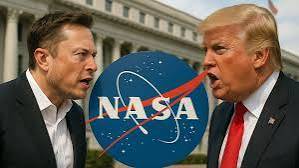Trump-Musk Clash Deepens Uncertainty Over NASA's Future.
By Pallab Ghosh, Science Correspondent..
The escalating dispute between former President Donald Trump and Elon Musk over a major spending bill has cast a shadow over NASA’s future, intensifying concerns about proposed deep cuts to the agency's budget.
NASA has submitted its latest budget request to Congress, proposing a nearly 50% reduction in funding for its science projects. If approved, this would result in 40 active or developing science missions being cancelled or suspended—an unprecedented rollback of the agency’s research scope.
Among the potential casualties is the mission that captured the now-iconic heart-shaped image on Pluto. It would be terminated mid-mission under the proposed cuts.
At the heart of the political row is President Trump's threat to cancel federal contracts with Musk’s SpaceX. NASA depends heavily on the company’s Falcon 9 rockets to ferry supplies and astronauts to the International Space Station. The agency also intends to rely on SpaceX’s next-generation Starship rocket to land astronauts on the Moon and eventually send them to Mars.
Dr Simeon Barber, a space scientist at the Open University, described the ongoing instability as having a “chilling impact†on the U.S. human spaceflight program.
"The astonishing exchanges, snap decisions, and U-turns we’ve witnessed in the last week undermine the very foundations we build our ambitions on.
Space science and exploration rely on long-term planning and collaboration between government, industry, and academia."
Sweeping Cuts, Shifting Priorities.
In addition to the Trump-Musk feud, many are alarmed by the overall direction of the proposed budget. All areas of NASA’s work face cuts—except for the human Mars program, which receives a \$100 million boost.
Casey Dreier of the Planetary Society, a space advocacy group, warns that the cuts represent “the biggest crisis ever to face the U.S. space programme.â€
NASA argues that the budget aligns science and technology efforts with its new core mission: the Moon and Mars. However, critics say this narrow focus endangers decades of research and collaboration.
Dr Adam Baker, a space policy analyst at Cranfield University, told the BBC:
> "President Trump is repurposing NASA for two things: to land astronauts on the Moon before the Chinese, and to have astronauts plant a U.S. flag on Mars. Everything else is secondary."
Supporters of the budget say it restores purpose to NASA not seen since the Apollo era, when beating the Soviet Union to the Moon was the agency’s central goal. Critics argue the space agency has since become bloated and inefficient, often exceeding budgets and timelines.
One major example is NASA’s Space Launch System (SLS), the agency’s new Moon rocket. It costs \$4.1 billion per launch and has faced repeated delays. In contrast, SpaceX’s Starship, which is reusable, is estimated to cost around \$100 million per launch. Jeff Bezos’s Blue Origin is also developing a reusable rocket, the New Glenn, with similar cost advantages.
Not surprisingly, the SLS is likely to be phased out under the new proposals. But there are worries about replacing it with unproven private-sector alternatives. Starship has yet to complete a fully successful launch, and New Glenn remains in early testing.
“NASA could be jumping out of the frying pan into the fire,†Dr Barber cautions.
“If Musk or Bezos pull back funding, Congress may have no choice but to cover their costs.â€
Ripple Effects Beyond the U.S.
The proposed cuts would affect not only American missions but also international collaborations. Two key joint projects with the European Space Agency (ESA) are in jeopardy: the Mars Sample Return mission and the Rosalind Franklin Rover mission.
Prof Sir Martin Sweeting, founder of Surrey Satellite Technology Ltd and co-author of a Royal Society report on space, noted that this shift could prompt Europe to rethink its reliance on NASA:
“Maybe we’ve been too reliant on NASA to carry the weight in space. This is an opportunity for Europe to seek a better balance in its activities.â€
Still, the immediate outlook for Europe is grim. ESA’s participation in the International Space Station, the Lunar Gateway (a planned Moon-orbiting space station), and numerous Earth observation programs could all be affected if NASA's budget is reduced.
Dr Baker warns that Earth monitoring missions—which track climate change indicators—may be among the most crucial losses:
“These programs are our early warning systems. Cutting them would significantly reduce our ability to predict and mitigate the effects of climate change.â€
A Battle in Congress
The budget proposals are still awaiting Congressional approval. According to Casey Dreier, some Republican lawmakers have privately expressed opposition to the cuts. But political deadlock could result in the White House’s slimmed-down proposal being adopted as a temporary default—potentially making the reductions permanent by default.
Dr Barber expressed concern about the long-term consequences:
“It’s tragic that something built over decades can be so quickly dismantled, with no clear plan for what replaces it.â€




No comments yet
Be the first to share your thoughts!